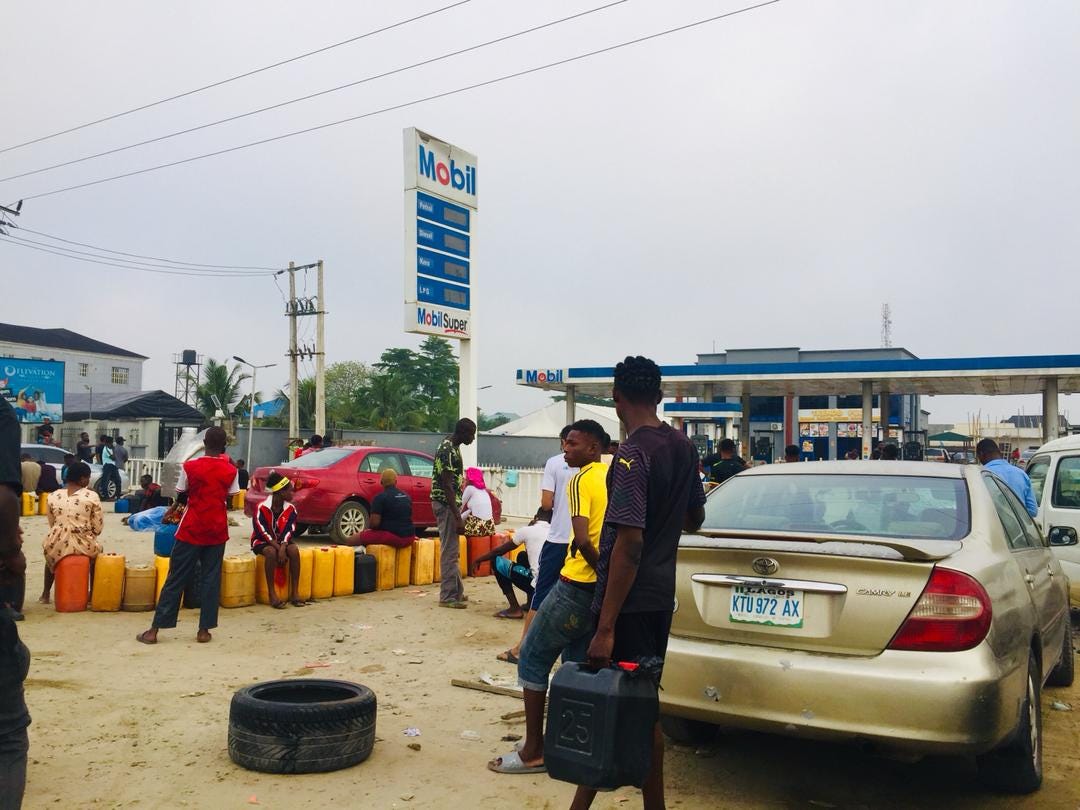How Nigerian creatives are dealing with the fuel scarcity
The continuous scarcity of fuel has continued to erode the gains of the creative sector.
For Victor Okoduwa, a creative and a videographer, meeting up with deliverables became a call for concern when he failed to show up to his team meeting. He was in the middle of completing a video when he ran out of fuel. His decision to venture in search of fuel made him postpone his deliverables, thereby hampering his work productivity.
He said, "I went to the fuel station and found a long queue all waiting to be serviced before it got to my turn. People were getting sacked in my presence just because they could not meet up with their deliverables, especially remote workers."
Before now, fuel scarcity in Nigeria used to be an occasional phenomenon. Things changed in January 2022 after oil trading firms imported the adulterated Premium Motor Spirit (PMS), into the country. The logistics of clearing the bad fuel created subsidy across the nation especially in Lagos and Abuja.
The fuel queues had since failed to abate, with the pressure on Nigerians growing worse in June of this year and now in November as the year slowly trails to an end. The lack of power supply both for transporters, creatives and small business have truly affected the power of production in Nigeria. This year alone, the power grid collapsed seven times this year and 98 times under the eight year tenure of President Muhammadu Buhari. In 2021, the World Bank said Nigeria loses $29 billion annually to unreliable power supply. These statistics just go to show how the loss of power continues to hamper efficiency in Nigeria.
For Joseph Dairo, a digital creator, he stressed the continuous scarcity of fuel has continued to erode the gains of the creative sector. He said he has tried to limit its effect on his work since he runs on fuel daily but it has affected his ability to meet targets.
He said, "I own a studio where I build on brand identity and I run on fuel 24/7. Scarcity of fuel affects our work, the pricing and the way we want to get paid and not everyone understands. Sometimes, you want to get a job done,and the price of fuel gets hiked again. What should take you three hours and you have a fuel of an hour, so you begin to miss deadlines."
The creator economy contributes just over 6.1% to global gross domestic product (GDP), averaging between 2% and 7% of national GDPs worldwide. Jobberman says that the creative sector currently employs an estimated 4.2 million Nigerians, making it the second-largest employer in the country, and has the potential to create an additional 2.7 million jobs by 2025. This statistics clearly demonstrate a potential in the industry
Similarly, the Director, World Intellectual Property Organization, Nigeria, Dr. Oluwatobiloba Moody, in a conversation with Creative Brief noted an uptick in the rise of creative content, especially from Africa, noting that so much potential abound for creatives in the sector.
Nonetheless, fuel marketers as well as the Nigerian National Petroleum Company Limited have continued to trade points why the scarcity has continued to linger. Already, the price has seen an increase from what used to N145 per litre early to this year to above N200 per litre in several filling stations in Lagos.
A source said it was based on the dollar regulation that was part of the problem.
“The dollar is affecting PMS purchase, something you were buying for about $15/tonne when the dollar was about N440 to N450, but currently the dollar is about N750 to N800. Definitely the price of the product will increase,” a marketer, who chose to be anonymous, said.
The National Public Relations Officer of the Independent Petroleum Marketers Association of Nigeria, Chief Ukadike Chinedu, stated that NNPC was currently finding it tough to continue subsidising PMS.
“The least that NNPC can sell petrol is over N400/litre to depots and not at N145/litre, but because of subsidy, which is becoming over-bearing on them, the oil firm has been struggling to subsidise.”
Meanwhile, the Independent Petroleum Marketers Association of Nigeria (IPMAN) noted that only a few filling stations had the product and were selling between N230 and N240 per litre.
A LinkedIn influencer, Olayinka Hannah believes that to combat these kinds of drawbacks, the creative has to be resilient.
"As a creative, I have challenges when it comes to the issue of electricity, and there is fuel scarcity right now. If you are Nigerian you can survive anywhere. As creatives we are in an abusive relationship with this country. It is felt in the Central Bank of Nigeria (CBN) policies. But in the midst of these, we try to find a way to face it," she suggests.








